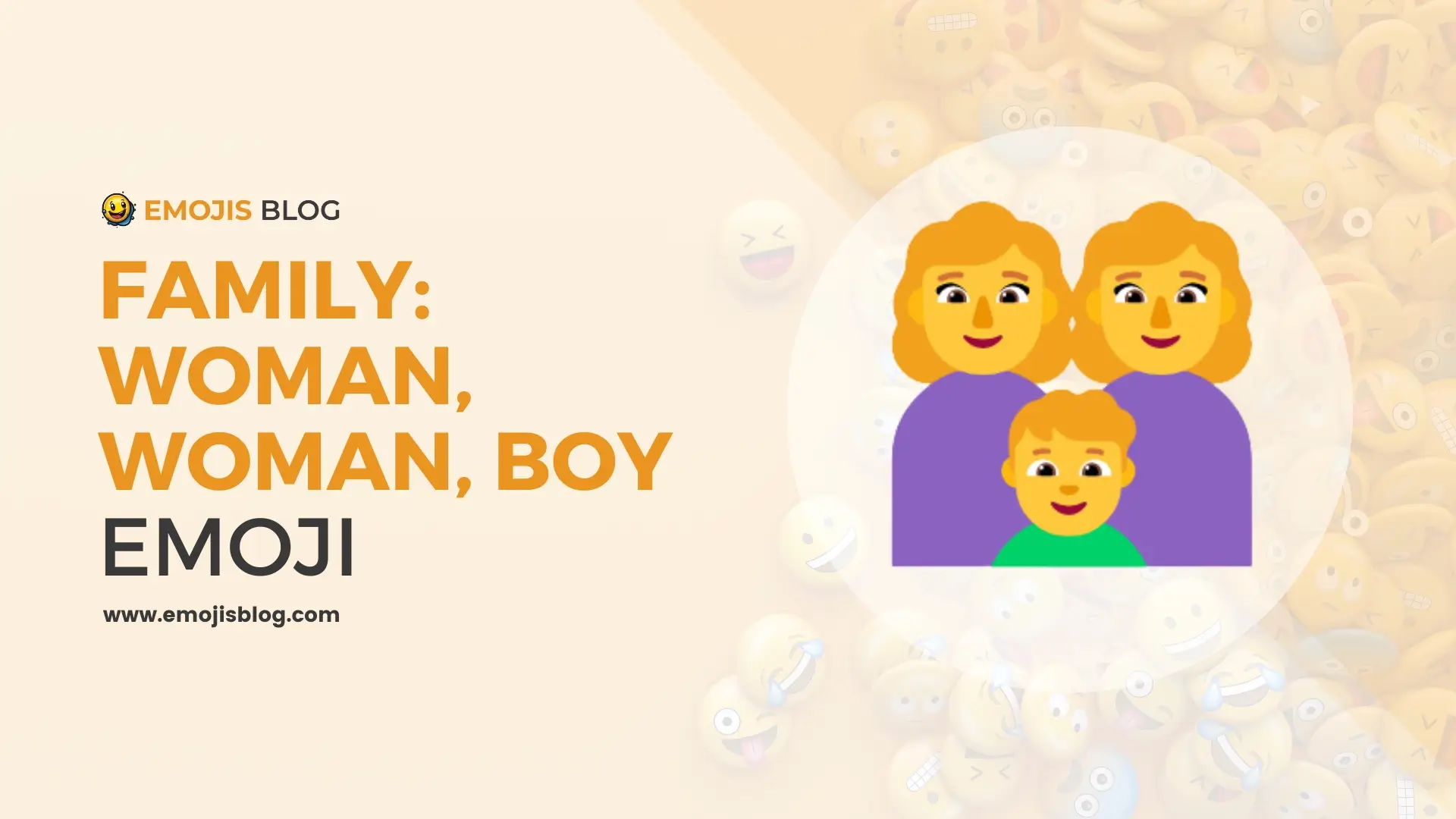What Does The Family: Woman, Woman, Boy Emoji 👩👩👦 Mean?
👩👩👦
Family: Woman, Woman, Boy Emoji 👩👩👦 Meanings
The Family: Woman, Woman, Boy emoji 👩👩👦 depicts a family consisting of two women and a boy, representing a same-sex couple with a child. It serves as a symbol of inclusivity and diversity, acknowledging and normalizing the existence of LGBTQ+ families in digital communication. This emoji is used by same-sex parents to visually express their family structure, by allies to show support for LGBTQ+ communities, and by anyone promoting the acceptance and visibility of diverse family configurations in society.
Technical Information
| Attribute | Information |
|---|---|
| Unicode | U+1F469 U+200D U+1F469 U+200D U+1F466 |
| Name | Family: Woman, Woman, Boy |
| Codepoints | 1F469 200D 1F469 200D 1F466 |
| Introduced in | Unicode 9.0 |
| Emoji Version | 4.0 |
| Shortcode | :family_wwb: |
| Platforms | iOS, Android, Windows, macOS, Linux |
| Category | People & Body |
| Subcategory | Family |
| Variations | None |
| Appearance | Two women and one boy, differing slightly across platforms |
| Gender | Female (two women) |
| Skin Tone Support | Yes, supports Fitzpatrick skin tones |
| ZWJ Sequence | Yes, uses Zero Width Joiner (ZWJ) sequences |
Understanding the Family: Woman, Woman, Boy Emoji 👩👩👦
The Family: Woman, Woman, Boy emoji 👩👩👦 is a part of the vast emoji library used in digital communication to convey emotions, concepts, and social structures. Emojis have become a significant aspect of modern communication, enabling users to express complex ideas with simple images. This particular emoji represents a family configuration that includes two women and one boy, symbolizing a same-sex couple and their child.
Origin and Evolution
The Birth of Emojis
Emojis originated in Japan in the late 1990s, created by Shigetaka Kurita for use on mobile platforms. Initially, they were simple, pixelated images representing basic emotions and objects. Over time, the emoji lexicon expanded, incorporating more diverse and inclusive representations of people and families.
Introduction of Family Emojis
Family emojis were introduced to depict various family structures and relationships. Initially, these were limited to traditional nuclear families. However, as the call for diversity and representation grew, so did the variety of family emojis. This led to the inclusion of emojis representing single parents, same-sex parents, and families of different sizes and configurations.
Representation and Inclusivity
Symbol of Diverse Families
The Family: Woman, Woman, Boy emoji 👩👩👦 is a symbol of inclusivity and representation in digital communication. It acknowledges and normalizes the existence of same-sex couples raising children. This representation is crucial in promoting the visibility and acceptance of LGBTQ+ families in society.
Usage in Communication
This emoji is used by individuals to represent their family structure in digital conversations. It is a way for same-sex parents to visually express their family dynamics, celebrate their identity, and foster a sense of belonging in the digital world. Additionally, allies and advocates use this emoji to show support for LGBTQ+ families and promote diversity.
Cultural and Social Impact
Promoting Acceptance and Visibility
The inclusion of emojis like the Family: Woman, Woman, Boy 👩👩👦 has a positive impact on societal attitudes towards LGBTQ+ families. It promotes acceptance by normalizing diverse family structures and providing visibility to underrepresented groups. This can contribute to a more inclusive and accepting society.
Reflecting Societal Changes
The evolution of emojis to include diverse family structures reflects broader societal changes and the growing recognition of LGBTQ+ rights. It signifies progress in the fight for equality and the acknowledgment of different forms of love and family.
Technical Aspects
Emoji Design and Implementation
The design of the Family: Woman, Woman, Boy emoji varies slightly across different platforms (such as Apple, Google, and Microsoft), but the core concept remains the same. It typically shows two women standing or sitting with a boy, arranged in a way that signifies a familial bond.
Unicode Standard
Emojis are standardized by the Unicode Consortium, ensuring consistency across different devices and platforms. The Family: Woman, Woman, Boy emoji is part of the Unicode standard, which means it is recognized and rendered similarly by all compliant systems.
Conclusion
The Family: Woman, Woman, Boy emoji 👩👩👦 is more than just a digital symbol; it is a representation of diversity, inclusivity, and the evolving nature of modern families. By providing visibility to same-sex parent families, this emoji plays a vital role in promoting acceptance and understanding in society. As digital communication continues to evolve, the importance of inclusive representation in emojis cannot be overstated, making emojis like this one a significant tool for social change.

